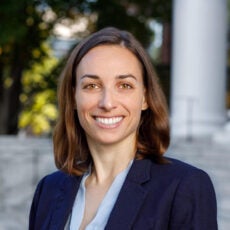
Energy Economics and Finance Seminar
Event Summary
The seminar series in Energy Economics & Finance (EEF) is jointly organized by Wharton’s Business Economics and Public Policy Department, the Kleinman Center for Energy Policy, and Wharton’s Business, Climate and Environment Lab. The scope of the seminar includes regulation and policy papers. The scope of the seminar also includes environmental and transportation issues, as long as there is a connection with energy. Sessions are biweekly on Mondays from 3:30 p.m. – 4:30 p.m.
Snacks, beer, and wine will be served after the seminar!
For Fall 2022, the seminar will be held in-person in the Kleinman Center Classroom (Fisher Fine Arts Building Room 306). We have a strong preference for in-person seminar attendance***, but if you are unable to make a certain session or are not based on Penn’s campus, please reach out to Dhivya Kaushik (email below) to get access to the Zoom link.
Find and add a Google Calendar version of the schedule on the BEPP seminar page.
To sign up for the seminar, please send your name, email, and affiliation to Dhivya Kaushik: dhivya@wharton.upenn.edu
Sarah Armitage
Economist FellowSarah Armitage is an Economist Fellow at the Environmental Defense Fund for the 2022-2023 academic year; she will join the faculty at Boston University’s Questrom School of Business in July 2023.
Title: “Technology Adoption and the Timing of EnvironmentalPolicy: Evidence from Efficient Lighting.”
Abstract: How does supporting early clean technologies affect the long-run transition away from dirty technologies? Early policy action generatesimmediate environmental benefits from increased adoption of available efficientproducts, but may result in intertemporal substitution away from later productswith greater potential for reducing externalities. I examine how standards andsubsidies supporting early advancements in lighting efficiency (halogens, CFLs)impacted the adoption of later products with higher efficiency (LEDs). Iestimate a model of residential lighting demand, using structural methodsadapted from dynamic models to capture how the market size and distribution ofconsumer heterogeneity depended endogenously on the history of past purchases.Counterfactual simulations suggest that delaying the implementation ofstandards from 2012 to 2018 would result in 36% greater LED sales over thisperiod, while delaying the phase-out of CFL subsidies from 2012 to 2018 wouldresult in 20% fewer LEDs sold. Across a range of specifications, I find thatenvironmental benefits from some early policy action outweigh the environmentalcost of reduced LEDs adoption; the overall environmental externality isminimized when standards are implemented in 2012 and CFL subsidies arephased-out after 2014. Sensitivity analyses around alternative technologylifetimes, externalities, and innovation responses identify conditions underwhich early policy intervention would be counterproductive.
Fall 2022 Seminar Schedule
- 9/22: Edson Severnini, Carnegie Mellon University
- 10/17: Sarah Armitage, Environmental Defense Fund
- 11/14: Beia Spiller, Resources for the Future
- 11/28: Jackson Dorsey, Indiana University
- 12/5: Meredith Fowlie, UC Berkeley

